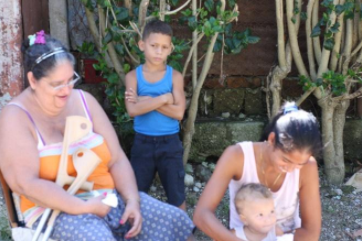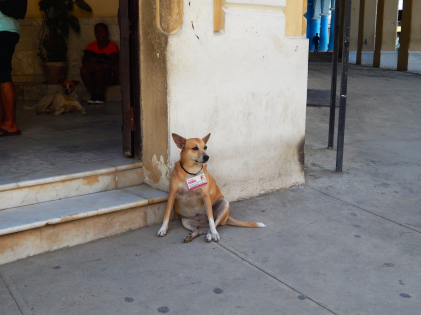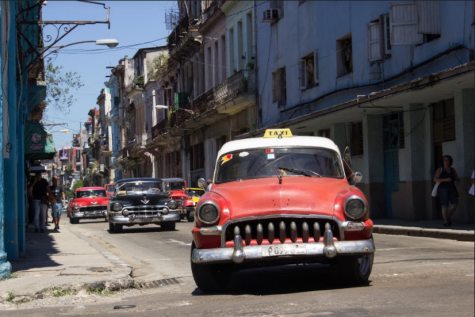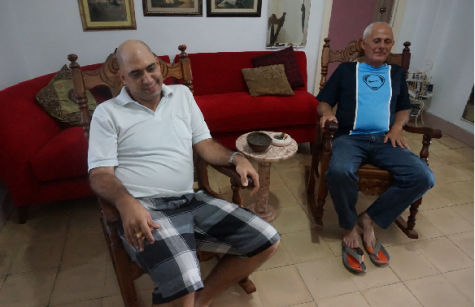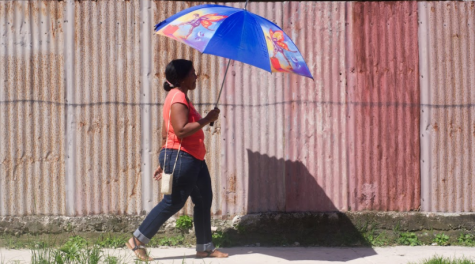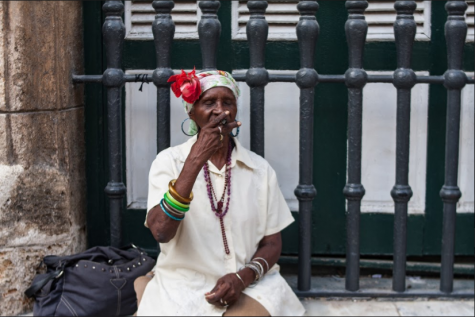Everyday life in Cuba is simpler than you imagine
It is always interesting when traveling abroad to experience that first reality check, which confirms you are not home. Today, in Havana, Cuba it is expected you will see cars from the 1950s, a not-so-modern airport, and experience weather in the triple digits always accompanied by humidity. What wasn’t expected was to enter a restroom, head to a stall while a Cuban lady yelled at me, “Lady, lady, lady,” as she handed me a piece of toilet paper barely large enough to wrap gum to discard. Maybe I’m exaggerating about the size; perhaps it was large enough for a quick wipe if you had not drunk loads of water prior to arrival. This was just the beginning of some unforgettable experiences in Cuba. I had no idea that wisdom, in addition to my rum and cigars, would be the most valuable thing in tow upon departure from the country.
Most of us know the history of Cuba and its bitter relations with the United States. Going in my initial thoughts were that if you’re a sympathetic, emotional type who doesn’t have ice water flowing through their veins, what can I do to help these people? It can be saddening during the visit because the Cuban people don’t have access to the superficial things most American’s have in the way of cars, designer clothing, accessories or even access to the internet which is 2 CUC for an hour for visitors and for Cuban people it is 50 pesos, the Cuban money. One CUC equals 50 Pesos and some of these people only make about 15 CUC a month, which is considered a good income.
During my visit, countless times I witnessed someone’s 1950s Chevy or Plymouth parked on the side of the road because it stopped working. I felt horrible because I couldn’t call an insurance company for them in the scorching heat. I even stumbled upon an accident and I couldn’t help but think, what happens in this type of situation? Do they swap insurance information and the cars get fixed or do they have to save up CUC to repair it or buy another? These are the type of thoughts that wandered through my head because I come from the America where these luxuries are commonplace. ‘I’m so privileged,’ is what I kept thinking, and it prevented me from enjoying myself completely because I wanted to help fix their problems. This became my mission, to help as many Cuban people as I could while in the country and getting to know what everyday life is like.
July 4 rolled around and I was set to meet with Dayana, who was our tour guide, so she could take me to her home and witness everyday life. The cab dropped me off at a cathedral in Old Havana but unfortunately, she never showed up. Instead of being upset, I proceeded to take advantage of my favorite pastime which is to shop for unique items. I walked into this a store, really to feel the air conditioning, but I met a worker named Mariela. She made it easy for me to strike up a conversation with her because as soon as I spoke, she was eager to know where I’m from, which is the perfect segway to talk about why I’m in Cuba. This boutique is big enough for only a few people at one time. Upon entry, there are all types of denim handbags that say Havana on them and immediately one catches my eye that I need to bring back to the States with me. She has everything in this small boutique, which is the size of an average apartment closet, from the Cuban dolls that are black on one side and white on the other, baseballs, bats, cigar holders, magic boxes, key chains, and T-shirts.
After eyeballing everything, I told Mariela why I was visiting Cuba and asked if we can talk about her life and what freedom means to her and she said yes. She grabbed a tiny wooden stool for me to sit and positioned herself on hers but before doing so she adjusts her skinny jeans. Mariela is curvy, with a reddish tint in her hair and I thought to myself, in all this poverty she is more stylish than many women at home with disposable incomes. “What do you want to know?” Mariela is straight to the point and I followed her lead by asking what has life been like for you here in Cuba? She replied in a sincere and confident tone, “Life is good, I mean we have our struggles but it is good.”
Mariela’s English is not perfect and she struggles to say what she means, but I was intrigued by her accent and completely sympathetic. The entire time I listened to her I was thinking how I would be able to help her, assuming she needs it. Mariela proceeded to talk about how she makes 300 CUC in a year. She works from 10 a.m. to 10 p.m. with two days off per week and only makes 10% of each item she sells, which is then divided with her son. “Well, I live in my family house and here in Cuba we don’t have rent or mortgage so the house is mine.” I then asked how she felt about the government. She replied, “I don’t care about the government, I just care about the good things and the bad things.”
She passionately talked about how in Cuba they have free education, free healthcare, no violence and no guns. The police are the only ones with guns and she said they have very little drugs and prostitution. She told me that where I’m from it is based on capitalism and then she asked me, “What’s wrong with a little bit of socialism combined with capitalism, there are good things from both?”
Mariela mentioned our racial and inequality issues in the states. She grabbed one of the Cuban dolls and told me how she sells these but doesn’t really like them because the white side represents privilege and the “Nigger” side is the slave. My eyes got big in this moment because she said the “N” word. I stared at her but it was apparent she had no clue this is an offensive word where I’m from. Mariela kept talking as if she is confident that the two of us are on the same page and in my heart, I felt we were. She began to tell me how life in Cuba is simple because they are people full of feelings and how they don’t think twice about helping Angolans to be free. She said they loved Fidel because he was a leader.
At this moment, a customer comes in to shop and I kept eyeballing the person in the store hoping they would hurry and leave so we could get back to our conversation. It was then I felt bad for having that thought, being that Mariela makes just 10 percent of what she sells and splits that with her son. The lady finally left and I asked her what freedom meant to her, not knowing her response would stick with me for the rest of my trip. She said freedom is going to the park with her kids, her family, husband and just spending time with friends drinking rum and dancing. She also said freedom is not worrying about money, but being polite, educated, intelligent and just enjoying life. Her last comment was about how people come from other places, mainly America, with all their money looking down on her but, she told me she sees them as, “A monkey, they dress in silk but still a monkey.”
A few days passed by and I couldn’t stop thinking about my conversation with Mariela. She made me think about what matters in my life, what I value and more importantly, she made me ask myself the very question I prepared for them. What does freedom mean to me?
I went to visit Isabel, who owns my favorite restaurant in Havana called Razones. This restaurant has become like home. It is small with two sets of narrow stairs that lead you to the top for dining. It is cute, quaint, colorful, with pictures of different patrons in frames covering the walls. Upon entering you smell the aroma of chicken, beans, and fish. There’s lots of hustle and bustle in Razones because it is always packed. I noticed they treat Isabel like she’s the boss. When I showed up, they told me to wait but I eventually got to meet with her upstairs. Isabel looked at me with her piercing eyes, side grin and asked what I intended to do with this information. I immediately let her know that I’m a student who just needs to get a good grade and I tell her a little bit about me. She chuckled, which was my confirmation that I got approval from Isabel.
Unlike Mariela, Isabel described her life as one with a bit more exposure. She lived in India for three years and spent some time in Mongolia with her parents, who are Cuban but left for a while. She came back, attended the University of Havana and upon completion of her studies, she became a secretary checking numbers with the government. I was curious to see what Isabel’s response would be to my questions about freedom and their government. She gave Fidel Castro a bit of praise by stating that he was intelligent, an orator, cultural, and he brought hope to Cuba. She said when he died, people were sad and it is the younger generation that is being brainwashed about who he actually was.
In the middle of our conversation, someone walked up, handed Isabel a bag of money and almost on cue another worker named Ernesto began speaking about Che Guevara while Isabel started counting. Ernesto fully distracted me by showing me his tattoo on his arm of Guevara’s face. It is beautiful and clearly displayed the love he has for Guevara. I realized how important it is for many of the Cuban people to continue to carry the torch for Castro and Guevara through their pride and willingness to stand their ground no matter how green the grass appears 90 miles across the water in America.
Isabel rejoined the conversation and when I asked her what freedom meant to her she said, “Free from outside influence from other countries.” She said socialism could be better but you all have to pay for education and healthcare. Her words are gentle but her message was strong as if she’s trying to give me a piece of wisdom and open my eyes to the deception in my own backyard. She continued to speak about how dangerous it is in the United States with the guns and all the other potential dangers.
I reflected on my own late nights leaving work to catch BART and how I always look around in hopes that no one will try to take my computer or my school-borrowed camera that I can’t afford to replace. Additionally, I thought about how I left a dance club in Havana around 2:30 a.m. to walk back to the hotel and didn’t have a care in the world on my way. The walk was about 15 minutes and not once did I think someone would come up and attack or rob me. Her message was not lost on me.
A few more days passed and I traveled to San Miguel, which is an area riddled with poverty. There are dirt roads and the homes are barely held together. While I walked through the neighborhood I kept peeking through doors and most of them are dark on the inside and seeming lack electricity. Life seems to be missing in these homes, but I quickly realized the people in this area function as a community, gathering together outside of their homes.
I met a lady named Edicice and spoke with her about everyday life in Cuba. She sat in a chair outside accompanied by a friend and granddaughter. She has what look like two canes, one for each arm, that look like they are hand-me-downs from the 1970’s. She began to tell me her story, which is like Mariela in the sense of working and making very little from it. I listened and eventually asked what freedom meant to her and what she thinks about her government. My focus has now shifted because initially, I thought Cuban people may need what little bit of help that I could offer, but instead, I found the Cuban people helping me. My perspective is changed and my focus is shifted from everyday life to how their experience has shaped and formed them into being these proud resilient individuals.
Just like Isabel, she said emphatically, “No!” when I asked her if she had the chance to come to America, would she? She said, “You don’t have health care and I have health issues. I would have to pay.” She also went on to explain how Cuba has its’ problems but not like us. For example, they don’t experience the violence that we have, which has now become a common theme in all of my interviews. She mentioned how once her roof was leaking and the government came out to repair it because that is what the government does when things like that happen.
I officially heard enough and now realized it was not my help the Cuban people needed, but it was their help that I needed. Here I am from the land of the free and the home of the brave, but after speaking with these individuals, I felt enslaved. I thought about returning to work once I got to the states and the image that popped into my head was my badge that hangs around my neck which serves as my reminder that I’m a slave to my work for health care. Without employment, I would have trouble seeking medical attention.
My perspective about the Cuban people needing my help has now changed because while we have riches in a monetary sense, they are very rich with pride and they possess the strength we will probably never have as Americans. It is now apparent to me that everyday life in Cuba is simple. Everyday life consists of focusing on being happy, engaging with your community and not worrying about things you cannot control. They are strong because they are united, something the U.S. is not. I felt like the Cuban people’s’ occasional mention of Donald Trump, followed by a chuckle and a raise of an eyebrow from some may have been their way of saying without saying don’t worry about us, we are fine, you have your own problems.


